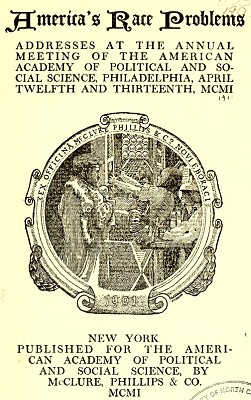 |
surfresearch.com.au
american apss : race problems, 1901 |
| home | catalogue | history | references | appendix |
|
Internet Archive
http://archive.org/details/americasraceprob00amer
July 1901
Page 10
What are the
causes of this exceptional development?
Under what conditions,
material and psychical, has that development taken place?
Only the briefest
answer can be attempted here, and that only for one typical group, the
Hawaiian. Some of the main conditions of this development were the following:
...
2. Climate. -
The Hawaiian
climate is the most equable tropical climate in the world.
It is never,
as in other tropical islands, excessively hot.
The usual range
of tem-perature is from 70 to 80° Fah.; at the sea level it never falls
below 55 Fah., nor does it ever exceed 90. Hurricanes and typhoons are
absolutely unknown.
This uniformity
and this immunity are due to an ocean current from the ...
Page 11
... north, which tempers the winds and laves the island coasts in an ever-flowing stream at a temperature of about 70 .
The innocent Hawaiian
climate favored the habit of outdoor life, which was almost universal,
the native huts being used only for sleeping places and for protection
from the rain.
It also developed
aquatic and seagoing habits.
The nearness
of the islands to each other, the gentle winds, the sea, never violently
tempestuous, though often rough, thesemade the natives the most powerful
and daring swimmers in the world, trained them in fishing and seagoing,
and tempted them away on long ocean voyages - as far as to the Society
Islands, 2,000 miles to the southward.
In fishing, too,
they became great experts.
Page 12
They had a very
acute eye for nature.
Their language
is full of terms for all visible things and doings; but it was little capable
of expressing general conceptions, such as time, goodness, temperance,
virtue; thus there were many synonyms for rain and sunlight, calm and storm,
but no word for
weather.
This deficiency
caused much trouble to the missionaries in the task of translating the
Scriptures into the native tongue.
The things most
valued by the natives in old times were the sticks of Oregon pine, which
at long intervals came drifting to the islands from the northwest coast,
and were eagerly seized to be fashioned into war canoes.
It is said that
when the translator came to the passage in the Epistles, reading: "Add
to your faith knowledge, and to your knowledge temperance, and to your
temperance virtue," he appealed to his native assistant for the Hawaiian
word for virtue, which he described as the most desirable of all possessions.
The native was
puzzled; neither the conception of virtue, as we understand it, nor any
corresponding word, existed in Hawaiian; but at last he said: "I understand
you now," and gave the missionary a word which made the passage read: "
Add to your faith knowledge, and to knowledge temperance, and to temperance
a stick of Oregon pine."
Page 21
Page 22
There is a Tagal
people, and it is of the Tagals that I am asked to speak, as one of the
races of the Philippines; a people among whom I have lived for two and
a half years.
...
Page 28
These natives
are great bathers, and while it would conduce to more universal cleanliness
if soap were always used, they stand, as a race, as close to godliness
as water alone can place them.
They seem almost
to be amphibious.
The washer- women
stand waist deep in water all day long.
The fisher, men
walk about in the water, sometimes neck deep, as they ply their trade.
The fish must
have taught the people to swim, so naturally do they glide through the
stream.
Even the boys
and the girls are often expert divers, and consider it an easy way to earn
money, to dive for coins that are thrown
in the water.
I have seen the
men descending a ladder from their boats to the bottom of a stream, with
buckets for dredging, and emerging only when these were filled with mud.
It has been reported
of them that they have dived under ships to ascertain whether the keels
have been damaged, and that in case of trouble they have gone under the
water to repair defective sheets of copper, driving in two or three nails
each time before emerging for a breath of air.
 |
America's Race Problems. McClure, Phillips and Co., Philadelphia, 1901. |

| home | catalogue | history | references | appendix |